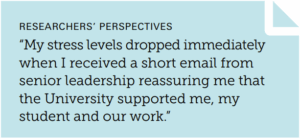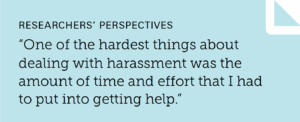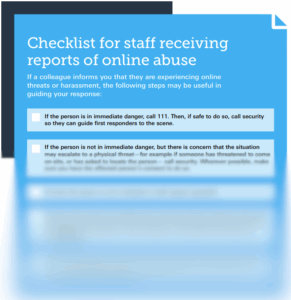The Science Media Centre has developed resources to help institutions effectively support researchers experiencing online harassment, thanks to support from Universities New Zealand.
▸ Guidance for research organisations 
This resource offers practical guidance for research organisations supporting staff targeted by online abuse from outside the institution, including cases where the harassment escalates offline.
It contains a pool of ideas to set up systems to deal with incidents of harassment, as well as proactive measures to protect researchers from online harm. These ‘building blocks’ reflect existing approaches in New Zealand and international institutions, and recommendations from researchers who have experienced harassment.

▸ Advice for staff supporting researchers facing harassment
Beyond practical steps to ensure the researcher’s safety and wellbeing, responses to reports of online harassment must build and maintain trust between the researcher and their institution.
A well-coordinated and thoughtful approach can reassure researchers that they are not facing the abuse alone. This document outlines key principles to help support staff respond effectively and build confidence in their systems.
▸ Checklist for staff receiving reports of online abuse
This is an example of a checklist for use by any staff member who receives a report of online harassment from a colleague. It is designed to be adapted for your organisation’s specific circumstances, e.g. to include contact information for security and support staff.
We have also adapted the Australian Science Media Centre’s toolkit for researchers into abridged, downloadable PDFs, which may be disseminated to staff as part of an institution’s strategy to support online safety.
The full AusSMC toolkit for researchers is freely available to New Zealand University staff via the SCIENCE MEDIA SAVVY training portal, thanks to support from Universities New Zealand.
The Science Media New Zealand thanks all the researchers who shared their personal stories, preliminary research, and other work to help us craft these documents, including Professor Katie Searles and the Researcher Support Consortium, Associate Professor Suze Wilson of Massey University, Associate Professor Siouxsie Wiles of the University of Auckland, Associate Professor Lara Greaves of Victoria University of Wellingtopn, Dr John Kerr of the Public Health Communication Centre, and others.
We also thank our reference group members for sharing their experiences and contributing to open, constructive conversations about how these resources can support all universities in New Zealand, including Catt Rayson, Sean Williams, and Liz Gosling from AUT, Todd Somerville from the University of Auckland, Farleigh Quinlivan from UniServices, Ali WIlkinson from the University of Waikato, and others from Massey University, University of Canterbury, University of Otago, University of Waikato, and Victoria University of Wellington.
A recording of our webinar launching these resources is available here.
Project lead: Katrin O’Donnell, Media Advisor, Science Media Centre NZ
Those interested in collaborating in the researcher support space in future can contact Fiona Clarkson, Communications Manager, Universities New Zealand – Te Pōkai Tara: Fiona.Clarkson@universitiesnz.ac.nz